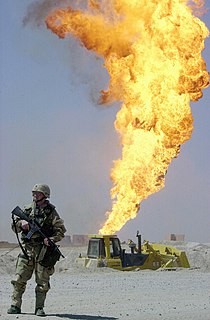
The United Nations Monitoring, Verification and Inspection Commission (UNMOVIC) was created through the adoption of United Nations Security Council resolution 1284 of 17 December 1999 and its mission lasted until June 2007.

United Nations Security Council Resolution 1441 is a United Nations Security Council resolution adopted unanimously by the United Nations Security Council on 8 November 2002, offering Iraq under Saddam Hussein "a final opportunity to comply with its disarmament obligations" that had been set out in several previous resolutions. It provided a justification for the subsequent US invasion of Iraq.

United Nations Special Commission (UNSCOM) was an inspection regime created by the United Nations to ensure Iraq's compliance with policies concerning Iraqi production and use of weapons of mass destruction after the Gulf War. Between 1991 and 1997 its director was Rolf Ekéus; from 1997 to 1999 its director was Richard Butler.

In United Nations Security Council resolution 661, adopted on 6 August 1990, reaffirming Resolution 660 (1990) and noting Iraq's refusal to comply with it and Kuwait's right of self-defence, the Council took steps to implement international sanctions on Iraq under Chapter VII of the United Nations Charter. This was the second resolution by the Security Council over the invasion of Kuwait.

United Nations Security Council resolution 986, adopted unanimously on 14 April 1995, after reaffirming all resolutions on Iraq and noting the serious humanitarian situation with the Iraqi civilian population, the council, acting under Chapter VII of the United Nations Charter, established a mechanism whereby Iraqi oil exports would finance humanitarian aid to the country, which later became known as the Oil-for-Food Programme.

United Nations Security Council resolution 1111, adopted unanimously on 4 June 1997, after recalling all previous resolutions on Iraq, including Resolution 986 (1995) which established the Oil-for-Food Programme, the council, acting under Chapter VII of the United Nations Charter, extended the provisions of that resolution relating to Iraqi oil sales for a further 180 days to meet the humanitarian needs of the Iraqi people.

United Nations Security Council resolution 706 decided on a mechanism to allow Iraq to sell oil in return for humanitarian aid from Member States. The council, acting under Chapter VII, adopted the resolution on 15 August 1991, after recalling resolutions 661 (1990), 686 (1991), 687 (1991), 688 (1991), 692 (1991), 699 (1991) and 705 (1991). The provisions of Resolution 706 functioned in a way similar to that which was later implemented in the Oil-for-Food Programme under Resolution 986 in 1995.

United Nations Security Council resolution 715, adopted unanimously on 11 October 1991, after recalling resolutions 687 (1991) and 707 (1991), the council, acting under Chapter VII of the United Nations Charter, approved plans from the International Atomic Energy Agency (IAEA) and Secretary-General Javier Pérez de Cuéllar regarding the long-term monitoring of Iraq's weapons programme, requiring it to submit "on-going monitoring and verification" of the country's dual-use facilities.

United Nations Security Council resolution 1051, adopted unanimously on 27 March 1996, after reaffirming resolutions 687 (1991), 707 (1991) and 715 (1991) on the monitoring of Iraq's weapons programme, the council approved a mechanism for monitoring Iraq's imports and exports of "dual use" items.

United Nations Security Council resolution 1134, adopted on 23 October 1997, after recalling resolutions 687 (1991), 707 (1991), 715 (1991), 1060 (1996) and 1115 (1997) on the monitoring of Iraq's weapons programme, the Council demanded that Iraq co-operate with weapons inspection teams from the United Nations Special Commission (UNSCOM) and expressed its intention to impose travel bans on Iraqi officials in the event of non-compliance.

United Nations Security Council resolution 1175, adopted unanimously on 19 June 1998, after recalling all previous resolutions on Iraq, including resolutions 986 (1995), 1111 (1997), 1129 (1997), 1143 (1997), 1153 (1998) and 1158 (1998) concerning the Oil-for-Food Programme, the Council noted that Iraq was unable to export petroleum or petroleum products sufficient to produce US$5.256 billion worth of oil and authorised countries to provide Iraq with equipment to allow it to meet that sum.

United Nations Security Council resolution 1194, adopted unanimously on 9 September 1998, after reaffirming resolutions 687 (1991), 707 (1991), 715 (1991), 1060 (1996), 1115 (1997) and 1154 (1998) concerning Iraq's weapons programme, the council condemned Iraq's decision to suspend co-operation with the United Nations Special Commission (UNSCOM) and the International Atomic Energy Agency (IAEA).

United Nations Security Council resolution 1242, adopted unanimously on 21 May 1999, after recalling all previous resolutions on Iraq, including resolutions 986 (1995), 1111 (1997), 1129 (1997), 1143 (1997), 1153 (1998), 1175 (1998) and 1210 (1998) concerning the Oil-for-Food Programme, the Council extended provisions relating to the export of Iraqi petroleum or petroleum products sufficient to produce up to US$5.256 billion worth of oil for a further 180 days.

United Nations Security Council resolution 1360, adopted unanimously on 3 July 2001, after recalling all previous resolutions on Iraq, including resolutions 986 (1995), 1284 (1999), 1330 (2000) and 1352 (2001) concerning the Oil-for-Food Programme, the Council extended provisions relating to the export of Iraqi petroleum or petroleum products in return for humanitarian aid for a further 150 days.

United Nations Security Council resolution 1409, adopted unanimously on 14 May 2002, after recalling all previous resolutions on Iraq, including resolutions 986 (1995), 1284 (1999), 1352 (2001), 1360 (2001) and 1382 (2001) concerning the Oil-for-Food Programme, the Council extended provisions relating to the export of Iraqi petroleum or petroleum products in return for humanitarian aid for a further 180 days and approved a list of revised sanctions against the country. Its adoption streamlined the sanctions program, with restrictions on shipping civilian goods to Iraq lifted though prohibitions on weapons and military goods remained.

United Nations Security Council resolution 1443, adopted unanimously on 25 November 2002, after recalling all previous resolutions on Iraq, including resolutions 986 (1995), 1284 (1999), 1352 (2001), 1360 (2001), 1382 (2001) and 1409 (2002) concerning the Oil-for-Food Programme. The council, acting under Chapter VII of the United Nations Charter, extended provisions relating to the export of Iraqi petroleum or petroleum products in return for humanitarian aid until 4 December 2002.

United Nations Security Council resolution 1447, adopted unanimously on 4 December 2002, after recalling all previous resolutions on Iraq, including resolutions 986 (1995), 1284 (1999), 1352 (2001), 1360 (2001), 1382 (2001) and 1409 (2002) concerning the Oil-for-Food Programme, the council, acting under Chapter VII of the United Nations Charter, extended provisions relating to the export of Iraqi petroleum or petroleum products in return for humanitarian aid for an additional 180 days.

United Nations Security Council resolution 1454, adopted on 30 December 2002, after recalling all previous resolutions on Iraq, including resolutions 661 (1991), 986 (1995), 1284 (1999), 1352 (2001), 1360 (2001), 1382 (2001), 1409 (2002) and 1447 (2002) concerning the Oil-for-Food Programme, the council adjusted the list of restricted goods and procedures for its implementation under the Oil-for-Food Programme. It was the final Security Council resolution adopted in 2002.

United Nations Security Council Resolution 1958, adopted on December 15, 2010, after recalling resolutions 986 (1995), 1472 (2003), 1476 (2003), 1483 (2003) and 1546 (2004) on the situation in Iraq, the Council terminated the residual activities of the Oil-for-Food Programme.



















